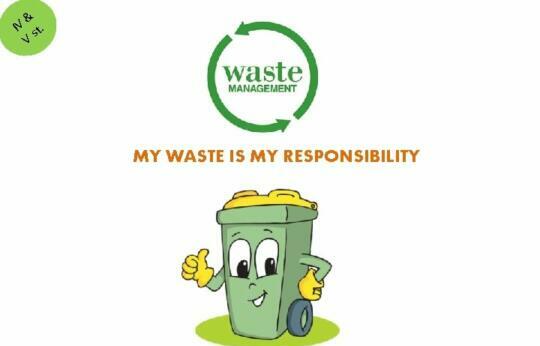Disposable plastic used at weddings and parties and other events without worrying about the plastic waste that is generated and the burden they will put into landfills. On the contrary, waste management means managing the collected waste carefully, separating it into different categories and reusing recyclable products. There are many ways to manage waste and clean the environment; the environment will be much cleaner if we manage the waste we generate. We need to step up and take responsibility for the management of the generated waste. In this article we are going to talk about my waste my responsibility initiative.
All about ‘My waste my Responsibility’
“My Waste My Responsibility” is the motto of a non-profit organization based in Coimbatore and started by three young people, Suresh Bhandari, Saran raj and Prashanth, that aims to implement ‘No Dumping’ and have cities without landfills. The organization has been working in the field of waste management since January 2016. From waste collection to segregation and processing and safe disposal of waste, the NGO not only manages waste efficiently, but also makes weddings and parties waste free.
The goal is not to load landfills with non-segregated, non-recyclable and non-biodegradable waste. To achieve its goal of no dumping, the organization is helping people, organizations and institutions to segregate and manage waste. The NGO believes that to achieve desired results, there is a need to increase awareness of how waste can be categorized at household and work levels.
To achieve the goal of preventing dumping, the organization assists individuals, organizations and institutions in the separation and disposal of waste. Since January 2016 the organization has worked in the field of waste management from waste collection to sorting, processing and safe disposal of waste. NGOs not only manage waste efficiently, but also make weddings and parties free of waste. I suspect they are promoting waste reduction and the idea that “responsible” people produce as little waste as possible.
The population cares less about the disposal of waste and throws it on the streets and roadsides. But if garbage belongs to every person, he also cannot be responsible for his own waste. Waste refers to any material that has no further use and is disposed of at a recycling, recycling or disposal facility.
Also Read : National Safe Motherhood Day 2021: Importance, History and Objectives
Responsibilities of each individual towards managing generated waste
Rather than treating waste disposal only as the responsibility of the authorities, we as an individual are collective responsible to effectively dispose of waste and to contribute to a clean environment. The relevant authorities are in full swing with waste disposal, but we also have a responsibility to help them and to keep the environment clean.
We need to ensure that waste is handled correctly so that it does not harm the environment or better yet, is beneficial to our lives. We have a responsibility to prepare our energy, our time and our resources to support the entire waste cycle because from the moment we buy them as useful items and how we use them, this will be useful for a long time and since we got rid of it later. Changes in waste disposal practices and methods may be required, but if done correctly, it can help to change the culture.
First, you can place containers of different colors in offices and commercial spaces by specifying the waste category: organic (food waste), inorganic (recyclable and non-recyclable), different colored containers can be placed in commercial spaces by specifying waste categories such as organic (fruits and vegetables) or inorganic (plastics, metals, etc. ). – rags collect garbage from public and private places and divide it into two main forms: dry and wet.
Our Responsibility Towards Garbage
Dry waste is a product that does not decompose easily and can be recycled, recyclable waste is sent for recycling, and non-recyclable waste is used as an alternative fuel resource (AFR). This would generate income from organic waste in the form of fertilizers and the rest could be sold as recyclable material. Students should strive to raise awareness and awareness among the masses of waste management and persuade them to separate before collection.
While it is easy to blame only the authorities, our academics and other industry experts can play a role in educating the public on innovative ideas for composting from organic waste or energy from the rest of the waste, citing examples from developing countries, but not realizing the real scenario. Our industry experts and alma mater always have innovative ideas for composting from organic waste or energy from waste, citing examples from developing countries, but not realizing the real scenario. We can learn from Netherlands, where the plastic waste is collected for road construction after it has been pretreated.
Also Read : Infant Mortality Rate in Bihar : From being one of the states with highest to its rapid decrease
